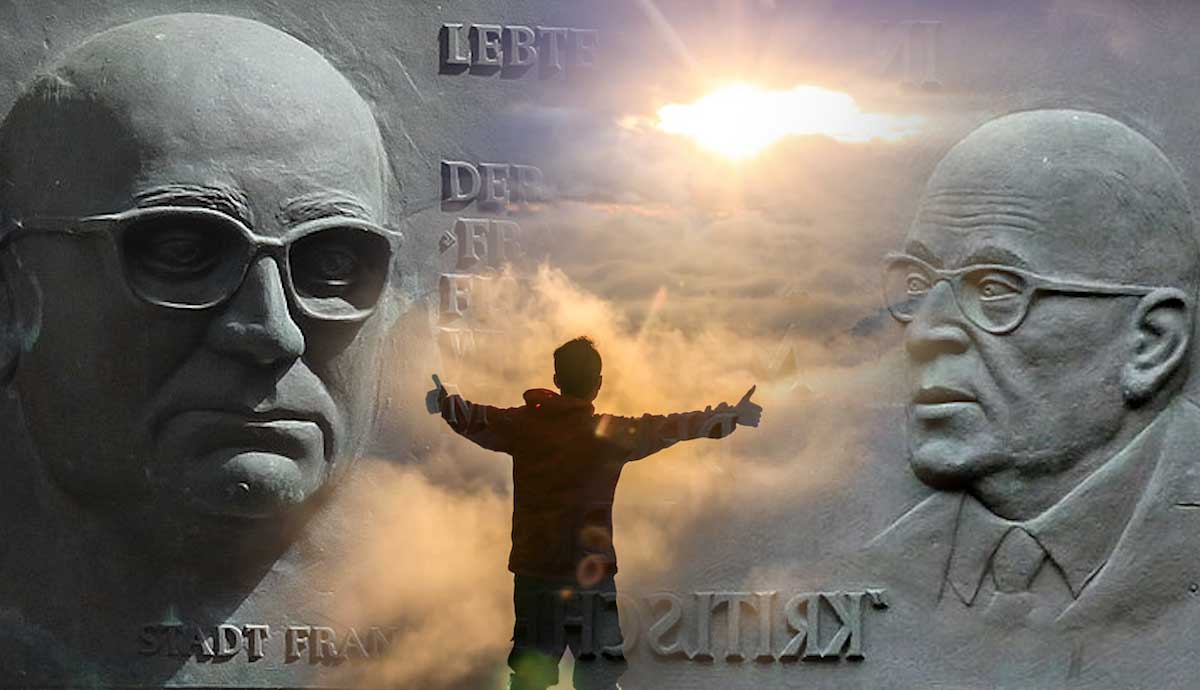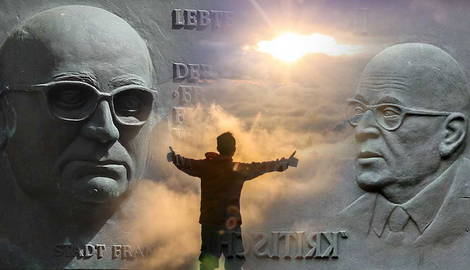
The Enlightenment is understood to be a period which brought a newfound appreciation for rationality, reason and the scientific method, a force for dispelling baseless myths. People would no longer be frightened by natural phenomena: they would understand them. Before the Enlightenment, people were prone to barbarism, to irrationality, to fear. The Enlightenment is – metaphorically – the light which illuminated the dark corners of the human mind and developed our capacities for reason to an extent never seen before. This process was closely tied to the development of the scientific method. Everything was to be put into numbers, measured, tested, proved, disproved. Adorno and Horkheimer shed some doubt over the standard interpretation of the impact of the Enlightenment
1. The Concept of a Totalitarian Enlightenment

The goal of the Enlightenment was for humanity to finally understand nature and exploit it for its own gain. This relationship of understanding nature, is, for Adorno and Horkheimer, similar to that of a dictator to his citizens. The idea is that we understand nature to the degree that we’re able to manipulate it. The more we can manipulate it, the more power we have over it. The more power, the more we are estranged from it. Lord Kelvin once wrote that:
“There is nothing new to be discovered in physics now. All that remains is more and more precise measurement.”
At this period there was a widespread belief that there was nothing more that the universe could tell us. If we knew the speed, acceleration, weight and all the relevant physical details of every object in the universe, we could predict everything else that would ever happen.
Reason mapped itself onto everything that existed and everything that could possibly exist. Nothing could frighten or surprise it. The Enlightenment is totalitarian. It gathers everything and translates it into the currency of numbers, into their instrumental essence.
2. What Is The Place of the Spirit of Enlightenment?

This spirit of the Enlightenment is for Adorno and Horkheimer deeply entrenched in the myths it tries to dispel. Repetition is their common denominator. The enlightenment motto is that once you translate something into numbers, you know everything you need to know about the object.
In myth, the Mana was something which escaped measurement, something more than the totality of the individual pieces of the world, a spirit which couldn’t be quantified and was expressed in the terror of the unknown. Enlightenment thinkers simply dismissed mana as a projection of the human spirit into nature where there simply was no such thing.
For Adorno and Horkheimer it is the precise opposite: mana is the echo of nature in the minds of primitive people. In the Enlightenment, even the unknown which hasn’t been quantified or measured yet is still measurable and quantifiable in principle. It is simply a matter of our scientific tools and precision. As H.A put it “The trial is prejudged”.
In this way enlightenment nullifies both subject and object. Whilst in myth the inhuman – nature – is seen as human, in the myth of the Enlightenment it is the human that is seen as inhuman. Both sides cancel each other out. When thought becomes a mathematical apparatus the world is condemned to be its measurement. The tension between mind and world is resolved at the cost of their negation.
3. Enlightenment Reverts to Myth

According to Adorno and Horkheimer, the Enlightenment and myth aren’t as separate as enlightenment thinkers would like to believe. Adorno and Horkheimer propose a twofold argument: that enlightenment reverts back to myth, and that myth is already enlightenment.
In the same way as myth fends off the unknown via magical rituals, so enlightenment finds it impossible to tolerate anything which can be left outside of its totalizing logic. Everything has to be translated in its terms. In this way, the Enlightenment is totalitarian. It nullifies everything it touches in order to understand it, and it understands it only insofar as the knowledge can be instrumental. Anything else is irrelevant or suspicious.
Enlightenment here gains a very complicated relationship with transcendence. On the one hand, it views it with suspicion since every truth claiming to be eternal, rising above the material particulars is a sign of mythical thinking and the blind belief in Gods that the Enlightenment seeks to dispel. On the other hand, with no transcendental truths, reason itself risks becoming personalized. This is the dialectical relationship that the enlightenment subject finds themself in, trying to escape their own subjectivity and reach out to a world they can never touch without transcendence.
4. The Relationship Between the Enlightenment, Myth, and Sacrifice

The notion of sacrifice in our modern understanding is that of an outdated practice, usually carried out by uncivilized people trying to appease their gods. For Adorno and Horkheimer, demythologization always takes the form of the revelation of the futility and superfluity of sacrifices. Its practice is seen as barbaric and should be overcome by the enlightened subject who understands that there’s no correlative relationship between throwing a surrogate victim in a volcano and next year’s crop yield.
According to Adorno and Horkheimer, the Enlightenment simply secularizes sacrifice, but it doesn’t abolish it. The same notion is present in exchange, for example. Think about the calls to open the economy we heard during the covid lockdown when thousands of people were dying and more were at risk. The market or the economy is here perceived as a God and the people who would die in order to appease it were the sacrifice we were offering it. They write:
‘The history of civilization is the introversion of sacrifice”.
5. Can Morality Really Be Based on Reason Alone?

For the Enlightenment thinkers, one of the goals was that of man freeing himself from his ‘self-incurred minority’ through reason: people should get rid of their inability to make sense of things on their own, without reference to others.
Reason in the Enlightenment establishes a self consistency and adheres to a hierarchy of concepts. Morality too had a part in the system. For Kant, it was a fact grounded on reason and not on the material interests of the subject.
The root of Kantian moral optimism is, for Adorno and Horkheimer, a relapse into barbarism. It expels difference. Reason becomes an organ of calculation, indifferent to ends and tasked only with coordination. It becomes instrumental.
Rationality and morality for Kant seem to have been tied together but the implosion of Fascist totalitarian regimes ultimately decouples them. We see perfectly rational systems organized into producing mass murder. Morality and reason diverge or rather conventional morality, including Kantian morality with its imperative of people not being used as means, are completely discarded. The facade of liberalism breaks down revealing the core of barbarism and totalitarianism.
6. The Culture Industry

Adorno and Horkheimer posit that our culture has been infected with sameness. Film, television, radio, and magazines all form a system of sameness. The common denominator, the fact that they’re all operating from a business standpoint, rids them of all responsibility of creating art or anything different.
This fact is used to justify the trash that is produced for mass media. The system of production is maintained by a cycle of manipulation and doesn’t really express an inherent need in people for such content. This is the conclusion of the instrumentalization of reason: society is alienated from itself and consumes its own experience through the sameness of its own self replication in culture.
The appearance of difference between different films or magazines is not real difference but simply categorization, a process which intends to catch every possible consumer in a net of manufactured desires.
Catering to each individual consumer difference has no doubt accelerated very rapidly in the internet age to the point where it has simply become inescapable. There’s something for everyone. Consumers are divided, classified, organized, and culture simply becomes mass production to meet differences to various degrees. Even those pieces which appear subversive, quickly get submerged in the same logic of pseudo differentiation.
7. The Disappearance of Genuine Culture

In this cultural schema, everything that is produced follows a predetermined trajectory and art fails to shock, subvert and surprise. Nothing can occur which doesn’t bear the logic of a preexisting jargon. In these conditions, there’s no boundary between genuine and artificial artistic expression. All of them come from the same apparatus.
When art is attached to the capitalist apparatus, it absorbs its logic, it is permeated by its need to sell more, to sell faster and to be manufactured quickly. It becomes a financial investment, stripped of its logic of pure expression. As such, it can’t say anything subversive. Even those works which supposedly aim to mock aspects of the culture industry, liberalism or Capitalism, simply end up reinforcing what they oppose.
Every rock thrown at the machine gets quickly repurposed, packaged and sold back to them. Resistance through this channel becomes futile. The culture industry reinforces the hierarchical structures through its mass production. It even offers to perform anti capitalism and radicalism on your behalf, so you don’t have to. The sitcoms laugh at their own content, with recorded tracks, just in case you’re too tired to laugh or in case you missed the funny parts. It anticipates its own consumption by the subject down to the minute details. It can’t say anything new. The culture industry is an endlessly repeating loop of sameness, the theme music for the average working person to accompany them through their day.








